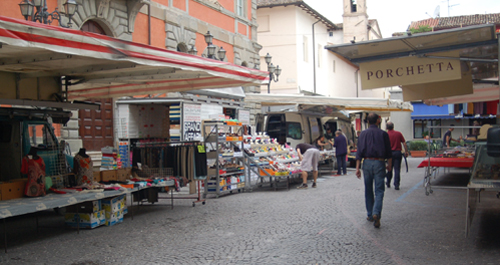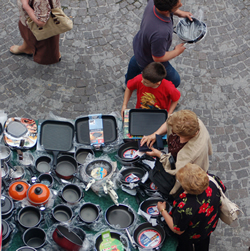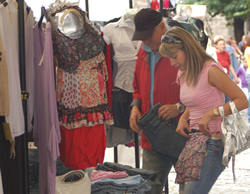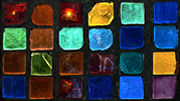
Merchants set up their mobile shops early each Wednesday.
Market Madness
Shoppers fill the streets as the weekly mobile market sets up shop
Text by Andrew Nute
It is the early hours of daylight in Cagli, and the Piazza Matteotti is just starting to come alive. As the town hall bell marks 7:15 a.m., a white van turns from a side street headed into the piazza. Soon similar vehicles follow.
To an American the awkward box on top of the vehicles might mark them as service vans. But any Cagliese would know the vans mean today is Wednesday, and for the next six hours the streets of this sleepy city will be jammed with the noise and energy of hundreds of people - just like shopping malls the world over.

Housewares are a popular choice.
Once a week the market rolls into Cagli in a tradition mirrored across most of Europe. Unlike small-town America, where big-box superstores and strip malls dominate the retail scene, rural Italy follows a model of traveling shopping centers that dates back hundreds of years. These vendors on wheels sell everything from meat, fish, fruits, and vegetables to clothing and house wares.
But purchasing goods often is not the only reason shoppers come out to this market every week. Like malls in America, markets are also social scenes.
"When we were young, this was the place to come out with friends and meet and see people," Abramo Sabatini says.
Sabatini has lived in Cagli all of his 23 years, and says the summer markets are more popular because the weather is more accommodating and children do not have to attend school while the market is in session.
The one-day malls apparently have little impact on the permanent, small-volume businesses that have kept town life alive and vibrant in places like Cagli.
The market seems popular with local store owners, who say they enjoy Wednesdays because the market brings people into town from the surrounding countryside. Some merchants like the Mezzolani brothers – Adriano, Roberto, and Marco – set up a van at the market to sell shoes even though they have a store in the new section of Cagli.

A wide variety of clothing is available.
Argenide "Argy" Catena, 52, agrees. She runs a store in Cagli that sells home furnishings and kitchenware, but often browses the market on Wednesdays for a short while before returning to her shop.
"All the families come out (to the market) because the products are cheaper," she says.
Catena claims the quality is lower at the market but the products are cheaper because the vendors do not have to pay nearly as much to the town as store owners do.
The town of Cagli charges the vendors a small fee per square foot to rent their spaces. According to city officials, an average of 95 vendors participate weekly, contributing about $18,500 revenue to the town annually.
Neither officials nor vendors know exactly how old the tradition is, but many guessed it goes back centuries.
Omar Martini, 24, from Fratterosa, has been working his family's traveling business in different town markets for three years, but his father has sold goods for forty years and his grandfather did it before his father. He says these businesses have been handed down from generation to generation for decades, if not centuries.
Each town in Italy has a specific weekday to host a market. Vendors typically purchase their goods from providers in other cities before hitting the road in vehicles designed for their specific purpose. Most vans are equipped with either built-in awnings or extensions, because the market doesn't stop for rain. Prices for the vans range from $30,000 for small transport vans with manual awnings to over $100,000 for vehicles similar to RVs that can cook and preserve meat and cheeses or fish. Fuel costs for the vehicles range from $460 to $630 a month, the vendors say.
Luca Dormi, 23, from Acqualagna, said his parents have been selling merchandise at markets for twenty years. Their business is buying high-end clothes from Rimini, Macerata, and Bologna in bulk and selling them at markets like this one in smaller towns for a profit.
Omar Martini's family buys shoes from Pesaro, Forl, and Fano. Some of the Italian shoes he sells are made in Macerata, and other shoes such as Crocs travel from as far away as Longmont, Colorado.
They arrive in small Italian towns like Cagli inside the vans that invade the city every Wednesday morning - and six hours later the market has vanished.

![]()
